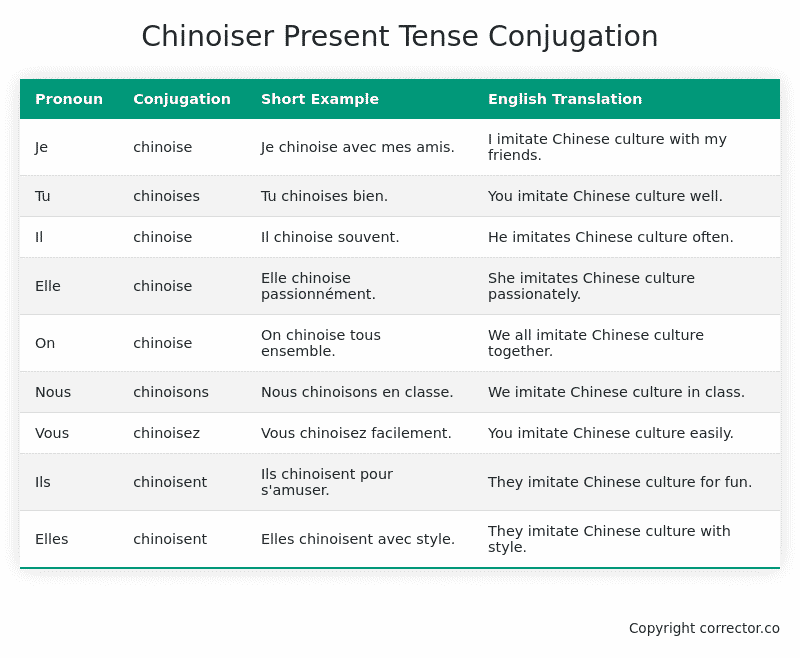Le Present (Present Tense) Conjugation of the French Verb chinoiser
Introduction to the verb chinoiser
The English translation of the French verb “chinoiser” is “to imitate Chinese style or culture.” The infinitive form of “chinoiser” is pronounced as “sheen-wah-zay.”
The word “chinoiser” originates from the French word “chinois” meaning “Chinese.” It is most often used in everyday French to describe the act of imitating or adopting Chinese style, culture, or aesthetics.
Examples:
- Elle aime chinoiser en portant des robes traditionnelles chinoises. (She enjoys imitating Chinese culture by wearing traditional Chinese dresses.)
- Les décorations de la fête sont inspirées par l’art chinois, ils ont donc décidé de chinoiser la soirée. (The party decorations are inspired by Chinese art, so they decided to give the evening a Chinese touch.)
- Il a chinoisé sa maison avec des meubles et des objets décoratifs chinois. (He decorated his house with Chinese furniture and decorative items.)
Chinoiser – About the French Present Tense
To take a deep dive into all the French tenses then see our article on Mastering French Tense Conjugation.
Common Everyday Usage Patterns For Le Present
Interactions with Other Tenses
Table of the Present Tense Conjugation of chinoiser
| Pronoun | Conjugation | Short Example | English Translation |
|---|---|---|---|
| Je | chinoise | Je chinoise avec mes amis. | I imitate Chinese culture with my friends. |
| Tu | chinoises | Tu chinoises bien. | You imitate Chinese culture well. |
| Il | chinoise | Il chinoise souvent. | He imitates Chinese culture often. |
| Elle | chinoise | Elle chinoise passionnément. | She imitates Chinese culture passionately. |
| On | chinoise | On chinoise tous ensemble. | We all imitate Chinese culture together. |
| Nous | chinoisons | Nous chinoisons en classe. | We imitate Chinese culture in class. |
| Vous | chinoisez | Vous chinoisez facilement. | You imitate Chinese culture easily. |
| Ils | chinoisent | Ils chinoisent pour s’amuser. | They imitate Chinese culture for fun. |
| Elles | chinoisent | Elles chinoisent avec style. | They imitate Chinese culture with style. |
Other Conjugations for Chinoiser.
Le Present (Present Tense) Conjugation of the French Verb chinoiser (You’re reading it right now!)
Imparfait (Imperfect) Tense Conjugation of the French Verb chinoiser
Passé Simple (Simple Past) Tense Conjugation of the French Verb chinoiser
Passé Composé (Present Perfect) Tense Conjugation of the French Verb chinoiser
Futur Simple (Simple Future) Tense Conjugation of the French Verb chinoiser
Futur Proche (Near Future) Tense Conjugation of the French Verb chinoiser
Plus-que-parfait (Pluperfect) Tense Conjugation of the French Verb chinoiser
Passé Antérieur (Past Anterior) Tense Conjugation of the French Verb chinoiser
Futur Antérieur (Future Anterior) Tense Conjugation of the French Verb chinoiser
Subjonctif Présent (Subjunctive Present) Tense Conjugation of the French Verb chinoiser
Subjonctif Passé (Subjunctive Past) Tense Conjugation of the French Verb chinoiser
Subjonctif Imparfait (Subjunctive Imperfect) Tense Conjugation of the French Verb chinoiser
Subjonctif Plus-que-parfait (Subjunctive Pluperfect) Tense Conjugation of the French Verb chinoiser
Conditionnel Présent (Conditional Present) Tense Conjugation of the French Verb chinoiser
Conditionnel Passé (Conditional Past) Tense Conjugation of the French Verb chinoiser
Conditionnel Passé II (Conditional Past II) Tense Conjugation of the French Verb chinoiser
L’impératif Présent (Imperative Present) Tense Conjugation of the French Verb chinoiser
L’impératif Passé (Imperative Past) Tense Conjugation of the French Verb chinoiser
L’infinitif Présent (Infinitive Present) Tense Conjugation of the French Verb chinoiser
L’infinitif Passé (Infinitive Past) Tense Conjugation of the French Verb chinoiser
Le Participe Présent (Present Participle) Tense Conjugation of the French Verb chinoiser
Le Participe Passé (Past Participle) Tense Conjugation of the French Verb chinoiser
Struggling with French verbs or the language in general? Why not use our free French Grammar Checker – no registration required!
Get a FREE Download Study Sheet of this Conjugation 🔥
Simply right click the image below, click “save image” and get your free reference for the chinoiser present tense conjugation!

I hope you enjoyed this article on the verb chinoiser. Still in a learning mood? Check out another TOTALLY random French verb present conjugation!


